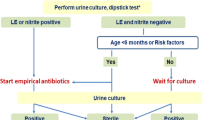Abstract
Purpose
To illustrate a simple method that screens for ureteral injury in the acute postoperative period after urogynecologic surgeries.
Methods
Serum creatinine measurements in the preoperative (baseline) and postoperative periods of urogynecologic surgeries were determined and the correlation of the change to ureteral injury and/or obstruction analyzed. The sample size calculation showed 7 cases and 28 controls were sufficient to detect significant changes in creatinine. Each of the seven cases was matched for age and type of surgery with a control patient in a 1:4 ratio following standard protocol.
Results
Chart review of patients (273 cases) undergoing urogynecologic surgeries from October 2009 to June 2014 were undertaken. There were 7 cases of ureteral injury and 28 matching control cases. All cases had intraoperative cystoscopy confirming bilateral ureteral flow. In the ureteral injury group, blockage of ureter was confirmed by CT scan with IV contrast. There was a 59.8% increase in serum creatinine levels postoperative in the ureteral injury group versus a 3.8% decrease in controls. A difference of creatinine levels greater than or equal to 0.3 mg/dL over baseline was evident in ureteral injury cases.
Conclusion
A small change in serum creatinine level over baseline after urogynecologic surgery alerted the possibility of ureteral injury or obstruction. A simple and inexpensive evaluation of perioperative creatinine levels can promptly diagnose ureteral damage in the acute postoperative period for gynecologic reconstructive surgeries.


Similar content being viewed by others
References
Gustilo-Ashby AM, Jelovsek JE, Barber MD et al (2006) The incidence of ureteral obstruction and the value of intraoperative cystoscopy during vaginal surgery for pelvic organ prolapse. Am J Obstet Gynecol 94:1478–1485
Dowling RA, Corriere JN Jr, Sandler CM (1986) Iatrogenic ureteral injury. J Urol 135:912–915
Tan-Kim J, Menefee SA, Reinsch CS et al (2015) Laparoscopic hysterectomy and urinary tract injury: experience in a Health Maintenance Organization. J Minim Invasive Gynecol 22:1278–1286
Vakili B, Chesson RR, Kyle BL et al (2005) The incidence of urinary tract injury during hysterectomy: a prospective analysis based on universal cystoscopy. Am J Obstet Gynecol 192:1599–1604
Harshman MW, Pollack HM, Banner MP et al (1982) Conservative management of ureteral obstruction secondary to suture entrapment. J Urol 127:121–123
Walter AJ, Magtibay PM, Morse AN et al (2002) Perioperative changes in serum creatinine after gynecologic surgery. Am J Obstet Gynecol 186:1315–1319
Anand M, Casiano ER, Heisler CA et al (2015) Utility of intraoperative cystoscopy in detecting ureteral injury during vaginal hysterectomy. Female Pelvic Med Reconstr Surg 21:70–76
Terek MC, Tamsel S, Aygul S et al (2006) How can we predict ureteral obstruction after gynecological surgery? The changes in Doppler resistive index and plasma creatinine and magnesium concentrations after surgical, unilateral ureteral obstruction in a rabbit model. Int J Gynecol Cancer 16:376–379
Stanhope CR, Wilson TO, Utz WJ et al (1991) Suture entrapment and secondary ureteral obstruction. Am J Obstet Gynecol 164:1513–1517
Acknowledgements
The authors would like to thank Dr. Malcolm Hardy, Gynecology and Obstetrics resident, Loma Linda School of Medicine, and Mr. Shagy ElHalawany, MBA, for their assistance in editing and database analysis.
Author information
Authors and Affiliations
Corresponding author
Ethics declarations
Conflict of interest
The authors declare that they have no conflict of interest.
Ethical approval
All procedures performed in studies involving human participants were in accordance with the ethical standards of the institutional and/or national research committee and with the 1964 Declaration of Helsinki and its later amendments or comparable ethical standards. Informed consent was obtained from all individual participants included in the study.
Rights and permissions
About this article
Cite this article
Siddighi, S., Yune, J.J., Kwon, N.B. et al. Perioperative serum creatinine changes and ureteral injury. Int Urol Nephrol 49, 1915–1919 (2017). https://doi.org/10.1007/s11255-017-1674-z
Received:
Accepted:
Published:
Issue Date:
DOI: https://doi.org/10.1007/s11255-017-1674-z




